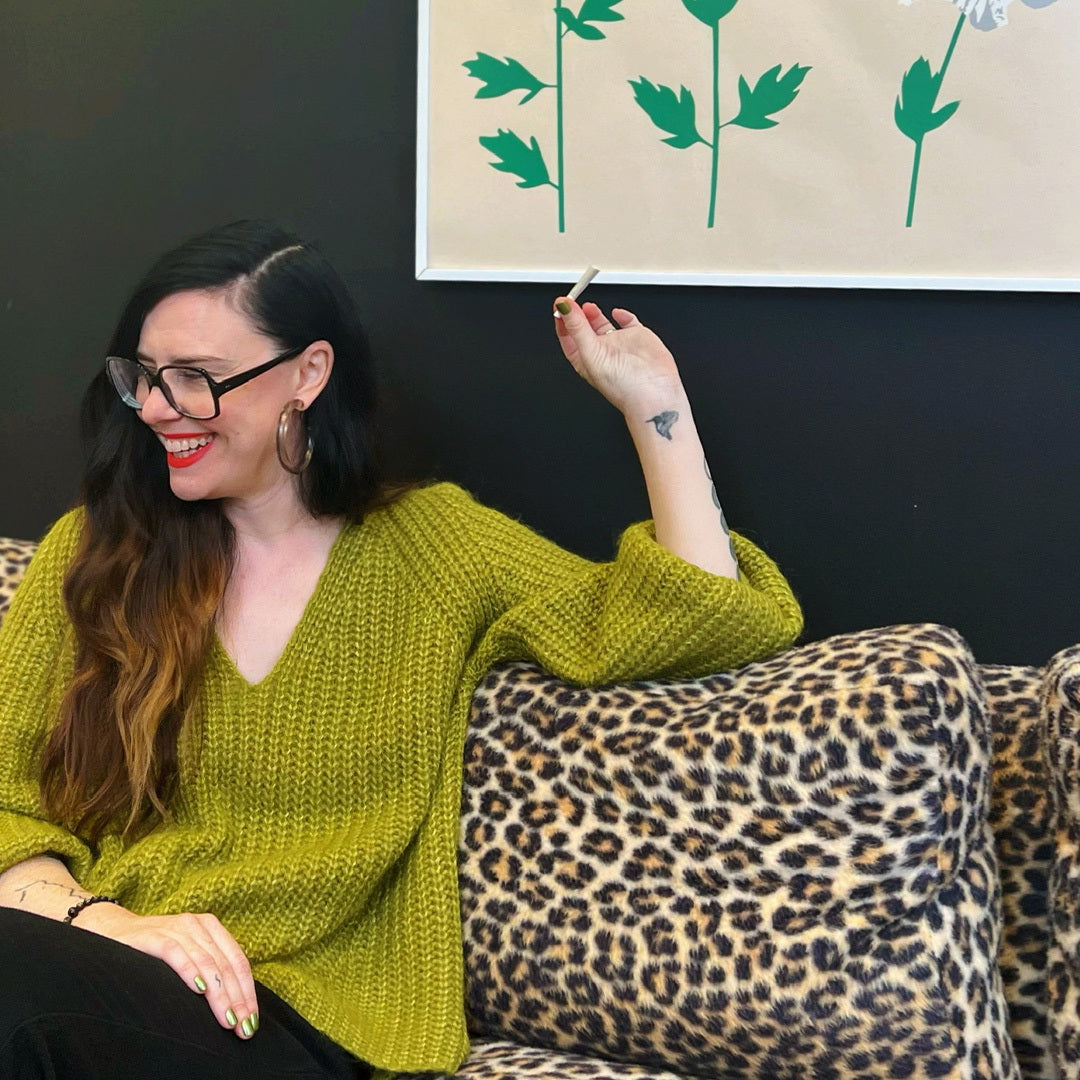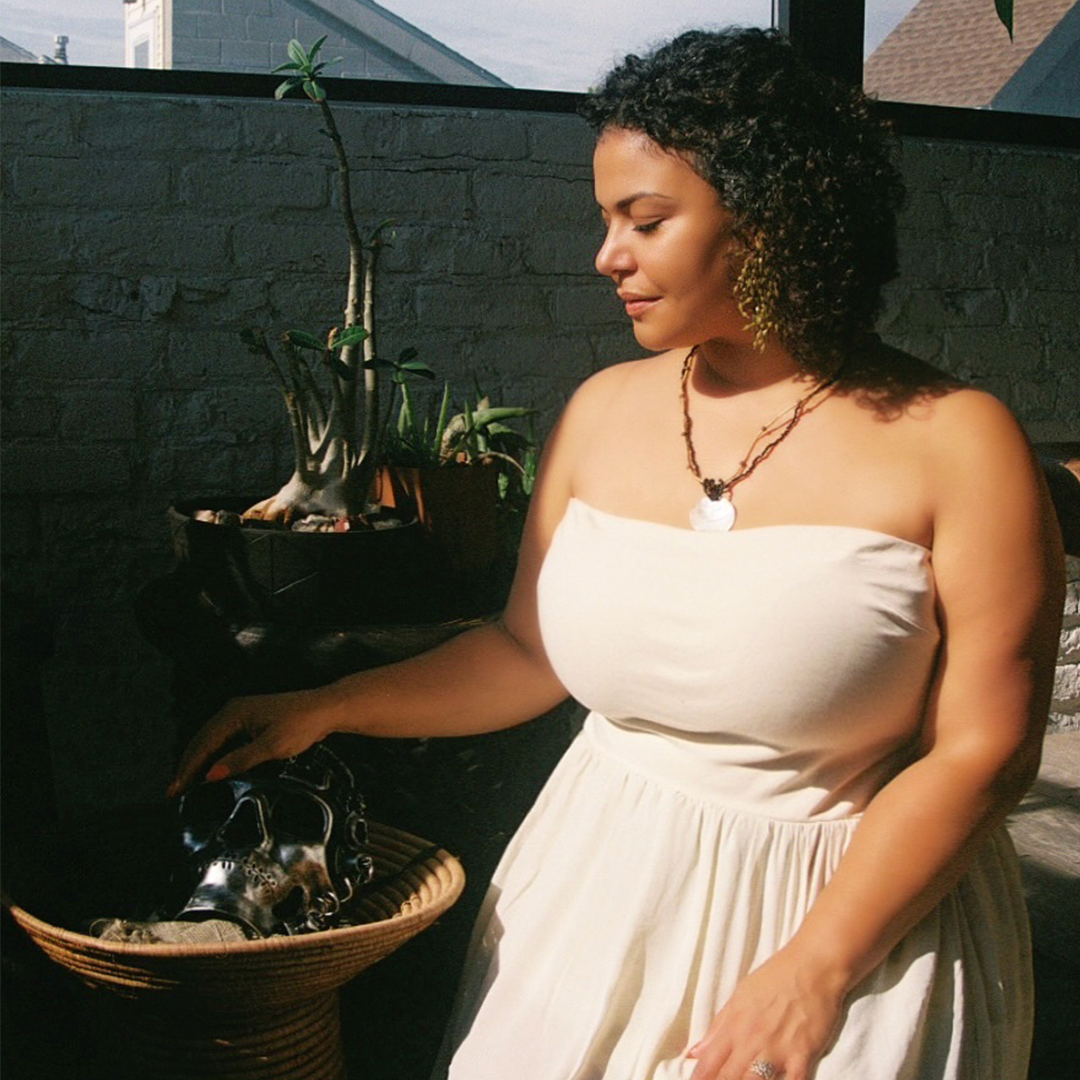"Hocus Pocus", "Harry Potter", "Sabrina", or Stevie Nicks. People love a witch. At least the pop culture kind. But how much do you know about real practicing witches?
A casual 330 years since the Salem witch trials, witchcraft is finally hitting the mainstream, thanks in part to the rise of #witchesofInstagram and #WitchTok. And no one knows that better than Erica Feldmann. Author of "HausMagick" and founder of HausWitch Home + Healing, Erica is one of the weed-loving witches leading this mystic resurgence by making the arcane arts accessible, challenging outdated systems, and dispelling stereotypes about the craft and cannabis.
Turns out, magic and many of the mindful and medicinal weed rituals practiced today are more intune to witchy spiritual knowledge than you might think—thankfully the whole burning at the stake thing is out. So let’s dive in…
What’s the story behind HausWitch?
In 2012, I had my graduate cohort in graduate school over for a housewarming party, and one of my friends was like, “Wow, could you make my house look like this? I don't have any money.” I was like, I think I could. So I had the idea of doing micro-budget interior makeovers, tied in with energy, like home energy, and also this idea of you don't need a lot of money if you have magic.
I started doing that, and I started blogging about it. My blog was called HausWitch. After a couple of years of doing the blog, I quickly realized it was not going to be a lucrative business because people who don't have any money can't pay interior decorators. I was kind of at this crossroad, and that's when I invented the spell kit.
We started with six spell kits that come in little house boxes that are so cute no one can resist them. They were all designed to bring different kinds of good energy into your space or remove bad energy. I launched them at the craft fair, and within three months Urban Outfitters reached out, then Anthropologie, Nasty Gal, and Free People. So I kind of knew I had something. That's when I decided to open a big, giant spell kit in Salem.
Before HausWitch, when did you start practicing witchcraft?
I came out of the womb primed for witchcraft. I'm a Scorpio rising, and in my family it just wasn't a taboo at all. On my mom's side, there was this casual, "Oh, yeah, grandpa's a witch. Oh, yeah, we're all witches." Nobody ever did rituals or dressed up or anything. It just was common knowledge, we're witches.
When I was young, I was very into witch pop culture. There was a movie called "The Worst Witch", which is an incredible B movie from the '80s, that was like my favorite thing ever. I wanted to go to witch school and carry a cat around in my satchel. I was like, that is the life for me.
I got really interested in divination. I think that was probably what felt the most like “this is what witchcraft is,” reading cards then playing with runes and stuff like that.
Then I definitely got into Wicca when I was a teenager. The thing with Wicca is that I didn't have access to all of the really specific ingredients that a spell would call for. I grew up in working class Illinois, so there was just not that. I kind of fell away from it because I really was turned off by the inaccessibility of it.
I actually fell away from witchcraft for a while. Then when I was finishing my degree in history, I studied abroad and took a class called Witchcraft in Early Modern England. I was like, this is where it all comes together—feminism and history and witchcraft—this is what I want to do for my life.
“There are people being persecuted for this, and we have to address that. And so we definitely always try to instill the message that even being able to call yourself a witch now is a privilege. And that it comes with a responsibility.”
Did your background in accessibility, history, feminism, and witchcraft shape your vision for HausWitch?
It's really important for me, when we are talking about spells and rituals, that we make it really obvious you can use whatever and these are just some suggestions. Use whatever you feel called to use because, ultimately, that is going to be stronger than reading what somebody else tells you to use.
Feminism is why witchcraft is so interesting to me. It is an archetype that is worth reclaiming for not just women, but any sort of intentionally marginalized group because throughout history, every intentionally marginalized group has been conflated with witches at some point.
In terms of reparative justice, it's similar in that there are still people being called witches around the globe today and facing persecution from it. And so—aside from reclaiming the archetype—I think it's really important to keep reminding people this is happening in the real world.
All of these things kind of come together in the house, which as a mission I would say we try to make it look really seamless and look like we're just selling candles and coffee mugs, but we’re actually trying to dole out some intersectional feminism in the process, and anti-capitalism. That definitely feels like exactly what I want to be doing with my life.
Do you think the perception around witches is shifting for the better?
I've lived in Salem, Massachusetts for the last 12 years, so I am in such a bubble that I am like, oh, no, we have moved on. We are all witches. Everybody's cool with it, like, whatever. And I know that's not true.
The second one of us steps outside of our little bubble, it's rough out there. I'm always taken aback by how much of that element is still there, but it's all Christian supremacy stuff.
“We're not doing that. We're not doing hierarchy. We're not doing genders. We're not doing sexualities. We're not doing religion in the same way. And I think that witchcraft offers people a way of practicing spirituality without these structures of big churches and big religions.”
Like with everything else, I think things women and intentionally marginalized folks are into always get a bad rap. At the same time, we're seeing the culture shift, like weed, away from Baby Boomers and towards Millennials and Gen Z.
I think that because of things like social media, and the fact that this does seem to be appealing to young folks in a different way, the stigma is going to keep having less and less influence. I think this era is about people getting to be what they secretly are more publicly and more openly, I hope anyway.
How do you integrate cannabis into your practice?
I really am so intentional about smoking because I'm intentional about everything that I do.I'm also really intentional about strain names, which I am with makeup too.
“I never understand why people are naming strains like White Nightmare and Straight Jacket OG and shit. I'm like, oh my god, who wants that? I want Cloud City Kush. You know what I mean? I want Lazy River Cake Pie, thank you.”
The way I really work witchcraft into my life, too, is by being really intentional about everything that I do. Obviously, I surround myself with objects of ritual and herbs and different sorts of ritual routines, and weed is the same way.
I definitely have my morning coffee, news podcasts, and first hit of the day. Then, at night, we have a product that we sell that we make called Ember. I like to say it's golden hour in a bottle and it smells like cinnamon. So my nighttime ritual is: I get to my couch, which is named Soft Island, and I spray Ember and smoke. That's my ritual. Not super witchy, but definitely a ritual.
What about personally?
At night it’s usually to relax, recharge. My wife and I have a weed strain that we like for romantic time, as well, so sometimes that's the intention we set at night. During the day, I think it was when I was trying to get into grad school that I started smoking during the day because I realized this helps me ground my ADD, and then it also does help me feel creative.
In this way now, I don't really try to restrain myself or anything like that because I really do think that weed helps me be the best version of myself in the same way that I feel like that about witchcraft too.
As a trauma survivor, I have never found anything that feels as healing and as helpful as weed, and, obviously, we don't need to get into Big Pharma, I'm sure you're all aware, but, you know, it's such a shame to me that this medicine has been so stigmatized for so long. For people like me, who are anxious, ADD, trauma survivors, my nerves are so raw that I definitely feel like weed is something that really helps soften. I like to say it's my bubble wrap. It's like wrapping myself in bubble wrap.






